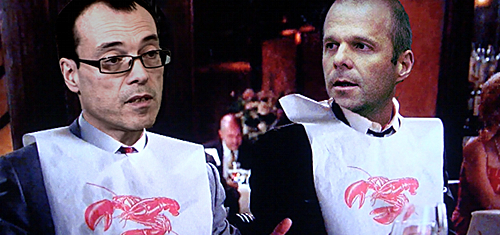 UK-listed online gambling operator Bwin.party digital entertainment has decided to award its two top execs bonuses worth nearly £1.65m before control is transferred to buyer GVC Holdings.
UK-listed online gambling operator Bwin.party digital entertainment has decided to award its two top execs bonuses worth nearly £1.65m before control is transferred to buyer GVC Holdings.
On Monday, Bwin.party announced that CEO Norbert Teufelberger (pictured on the right) had received a restricted share award of 916,091 Bwin.party shares, while CFO Martin Wiegold (on the left) received a nil-cost share option of 674,152 shares. Based on Monday’s closing price of 104p, Teufelberger’s bonus is worth over £944k, while Wiegold stands to collect a comparatively paltry £702k.
The shares were doled out months ago as part of the company’s 2014 Incentive Plan (BIP) and based on the company’s performance in the year ending Dec. 31, 2014. The announcement had been delayed due to the protracted wheeling and dealing surrounding Bwin.party’s efforts to flog itself to the highest bidder.
The bonuses – which follow similarly generous money showers in 2014 – represent just over two-thirds of the maximum allowable entitlement under the BIP, suggesting that Bwin.party’s board is capable of exercising some restraint when It chooses to. Yet the overriding question remains: just what did either exec do to justify such a handsome top-up using shareholder money?
True, Bwin.party shares have rebounded somewhat from their 78.4p nadir this March, but most of the gains have been based on speculators banking on a post-merger bump, not the company’s performance vs. its competitors. And the Dec. 31, 2014 closing price of 117.8p was 5.3p less than its price on Dec. 31, 2013.
Among the benchmarks established under the revised BIP was to “stop the revenue decline in poker.” In Bwin.party’s most recent earnings report, PartyPoker revenue fell 23% year-on-year and Teufelberger declared that Bwin.party would no longer be “investing heavily” in its flagging poker division. So, er, well done?
It’s worth noting that the BIP was revised in 2014 because Bwin.party’s shares had fallen so precipitously from their IPO price that the established bonus benchmarks were deemed no longer achievable. So, like those ‘everyone gets a trophy day’ events at elementary schools, the benchmarks were revised downward so that management could claim victory despite its abject failure to achieve much of anything.
Word has it that early drafts of the revised BIP contained a raft of other easily attainable objectives, such as “achieving a vertical posture following a long night’s sleep” and “successfully negotiating movement of pizza slice from plate to mouth without spilling mozzarella on one’s tie.” They must have been removed after management protested that they were unrealistically ambitious.
